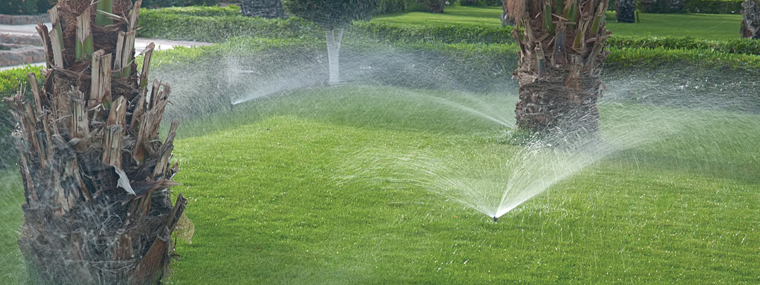
Taking Care of Your Property
To Water and To Protect
Published April 2018
Editor’s Note: The following advice is presented to aid board members in carrying out their responsibilities.
 Water Your Turf Efficiently and Effectively
Water Your Turf Efficiently and Effectively
By the Florida Evergreen Team
It doesn’t really matter where you live in Florida right now because we are in the driest time of year. That’s not to say the requirements aren’t less in the Panhandle than they are in South Florida, but we get the least amount of rain during this period; and with rainy season still off in the distance, it’s a good idea to stay on top of your irrigation needs.
The University of Florida IFAS Extension Service offers recommendations on watering frequency based on season and locale. Here are just a few helpful hints to help ensure you (your irrigation company) are watering correctly.
- Adjust for the season you are in and never overwater. Overwatering will harm the turf health and increase susceptibility of disease.
- How much you water (volume) shouldn’t vary seasonally; it’s the frequency of watering that needs to be adjusted.
- Whenever possible, water in the early morning hours. Just like overwatering, if you water at the wrong times you are wasting water and creating an environment for disease.
- Make sure you or your maintenance provider is aware of local irrigation ordinances. These vary throughout the state and many counties/municipalities have implemented new guidelines over the last few years.
You can learn more by logging on to the University of Florida IFAS Extension website at ifas.ufl.edu. Good luck!
For more information on Florida Evergreen Landscape & Lawn Care, call (239) 561-9184 or visit www.FloridaEvergreen.com.
 Protect Your Assets!
Protect Your Assets!
By Lewis C. Midlam, PE, SI, SECB, President
Protect your assets! An association’s buildings are usually its biggest financial asset. Yet all too often, owners believe that they will last forever. After all, they have been just fine for 20 years, so why won’t they last another 20, 40, or 60 years? Unfortunately, concrete, steel, wood, and every other building material doesn’t last forever. All materials deteriorate, especially in Florida’s brutal climate, and especially along our salt water coastlines.
When steel corrodes, it expands, cracking and breaking concrete. Wood eventually rots, especially when it gets, and stays, wet. Water intrusions, poor construction, poorly done repairs, and a lack of maintenance can send an association’s finances into a nosedive as the need for special assessments becomes evident. Inclusion of these items in budgeted reserves can help as can consultation with an experienced engineer—first to get a handle on the scope of the problem, then to assist the association in getting needed repairs effected. In most cases, addressing a problem head-on is better than sticking one’s head in the sand.
For more information on LCM Engineering PLLC, call (239) 590-0263, email Lew.Midlam@lcm.com, or visit www.lcm.com.


